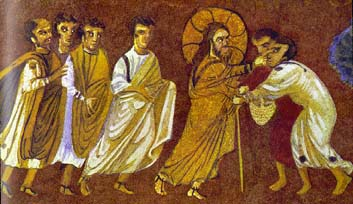I’m a day behind – sorry. This next week is about identity. In reading the story of Palm Sunday (Matthew 21:1-17) which we read in public worship this Sunday (April 13th) I’m struck by the question “Who is this man?” in 21:10. This one text gives multiple answers and titles, full with meaning. From that my thought for the week is to focus on the different parts of the one identity of Christ that we experience in the encounters of diverse people with Jesus in Matthew 20 and 21, as well as that we ourselves encounters in our lives. I’m starting in large part from original material written by the fabulous Dale Bruner on “The Five True-Christ Encounters” in his Commentary on Matthew, Volume 2.
Jesus as Merciful & Healing Lord ::
the healing of the Blind Men in
Matthew 20:29-34
Jesus is being followed by a boisterous and supportive throng, as he leaves Jericho and heads to Jerusalem. The crowd is re-enacting in a sense the entry of the Israelites into the Promised Land – in which they first came to and through Jericho.
On the path are two blind men. They know what’s happening and they cry out, asking for mercy “Lord, have mercy!” in the Greek “Kyrie, eleison” – as beggars did in those days. The words the exact ones used in the ancient and common prayer for help and forgiveness, sung in traditional liturgies….Kryie eleison. Lord have mercy! “Lord” was the common word for “sir” or to designate respect. And it was also the common title for God, as it is in the English of today. The blind men also call him “Son of David” – the Jewish term for Messiah – the promised leader to come to deliver Israel from its enemies, promised to come from the royal line of King David.
Ironically it’s the blind men alone who see Jesus and recognize him. The story summarizes the theme of spiritual blindness developed throughout the ministry of Jesus. Those who see, are blind. They are looking for what they want, or what they expect to see, for the Messiah they imagine, can control, or would like to have. Only the blind have sight, recognizing Jesus for who he truly is.
The crowd of people – including the disciples most likely – rebuke the blind men. They’re too loud. They’re inconvenient. They’re ruining the atmosphere. They’re a drag. They’re not important, or important enough to be bothered for. Ironically those whom claim to know Jesus and follow him, impeded those who need him from coming to Jesus. The name Jesus, from Joshua in Hebrew, means “God saves.” Ironically it’s the followers of Jesus who are the obstacle to those who want to come to and encounter him.
The blind men are persevering, maybe desperate, convinced, convicted, impassioned….they call out louder. They will not be silenced, or overlooked, as they usually were because of their disability. Again they call out “Have mercy on us Lord, Son of David!” I can almost hear them. It’s their urgency, desperation, authenticity, honest need – their faith – that stops Jesus. His heart goes out to them. And in their conversation Jesus responds to their request and heals them.
The blind men respond by getting up and following Jesus, coming after him in his footsteps, joining the crowd which just rebuked and rejected them. Did they walk in the front? the back? the middle? next to Jesus? They respond with gratitude, commitment, conviction. Where else would they go? They know and see who Jesus truly is – even with blinded eyes.
Questions for reflection:
- How have you experienced Jesus as a healing God, the chased one of God who comes to save us from our brokeness, from ourselves, from each other?
- When have you encountered God’s saving power in your life?
- When have you experienced the people of God as an obstacle to faith?
- How have you responded to God’s saving grace in Jesus, as the blind men did on that road?
